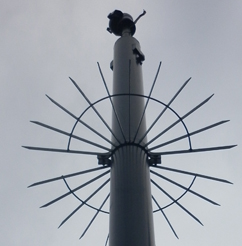In a further sign of how councils, particularly in the countryside with smaller CCTV systems, are looking to save by centralising control rooms, a Cambridgeshire council is proposing to merge its CCTV into a ‘shared service’ with Peterborough City Council by November. That work will be by one, merged CCTV manager.
Fenland District Council’s CCTV is typical small-town British public space surveillance. It dates from the mid-1990s; it covers four market towns – Wisbech, March, Chatteris and Whittlesey. In 2009 the monitoring – always the largest cost for a council – came in-house. The council has under austerity, appreciating that CCTV is not a statutory service (in other words, unlike collecting household rubbish, the council does not have to provide CCTV), has sought savings. It looked at merging with Kings Lynn, and Huntingdon. Like many other councils it went to wireless transmission to do away with leasing cabling; it brought alarm monitoring into the control room; it found ‘new income streams’, namely monitoring for two local hospitals, and the lone worker monitoring for a neighbouring council; and gave extra work to the monitoring staff, such as ‘homeless triage’ out of office hours. That evidently was not enough.
A report to the full council in January spoke of having to save more; hence ‘a service redesign’. In plainer English that meant either Fenland or Peterborough closing their control room and it would cost less for Fenland to give up theirs. Fenland’s control room is smaller than Peterborough – Fenland’s monitors 75 analogue-era cameras and still has an analogue command and control system, though it does record to servers. Peterborough has twice as many cameras and pays its operators more than Fenland. The smaller the set-up, the less resilient it is; the Fenland report told councillors of ‘problems maintaining the presence of an operator as a result of unforeseen staffing sickness’. In other words, Fenland’s control room runs on a single operator, and what if he’s taken ill? Why choose Peterborough? The report spoke of ‘50-50 partnership’; that is, councillors, keen to show local voters that a service is as good as ever, don’t want a bigger council to ‘take over’. The merger does offer a better service. Such as: the prospect of double operators, and ‘demand analysis’ of when there’s most to do may not be surprising: Friday, Saturday and Sunday nights; weekends in the middle of the day; and other weekday evenings. Also, Peterborough’s control room has a paid police employee there weekdays to review footage, whereas at Fenland a volunteer does that work.
To sum up; the budget squeeze in local government is still on – Peterborough setting its budget has warned that it has had to find sizeable savings for seven years and still has to make ‘significant savings’.
This merger does mean operators in Wisbech and Peterborough (21 miles apart) apply for jobs in the single centre; but, the bottom line is that councils are still spending on CCTV, rather than pulling the plug. In January, Richmond borough in west London oddly publicly denied it was turning its cameras off to ‘save power’. Fenland allocated £110,000 for capital spending next year and intends to upgrade its cameras to digital in the medium term. Nor is the new thinking over yet; the councils have mooted the setting up of a Local Authority Trading Company (LATCO). Peterborough set up a LATCO last year to take on work done by the contract firm Amey, such as street cleansing and parks management.
Councils are thinking more of generating revenue; the job of CCTV manager for the merged service will include ‘marketing the CCTV service to new commercial opportunities’. That said, local government appears to be opting for not outsourcing. Peterborough council spoke of considering outsourcing its CCTV, but this was ‘discounted due to unacceptable cost implications’.
What do users say? Police are behind about half of the demand for the service. Fenland police are happy the service will be as good. They’ve gone through a ‘restructure’ of their own, and the two council areas (for police and fire services) are together as a ‘northern’ county unit. Anyone arrested in Fenland goes to Kings Lynn, a dozen miles in the other direction from Peterborough. Fenland council also got OKs from Horsefair Shopping Centre in Wisbech and a local housing association.
What, you might ask, is getting in the way of yet more merging, if Fenland-Peterborough merging its CCTV is so sensible – given the lack of outcry? The answer is contract practicalities. Huntingdon and Cambridge City already share a service, but those two neighbouring councils are tied into a contract with a CCTV provider until 2021.










